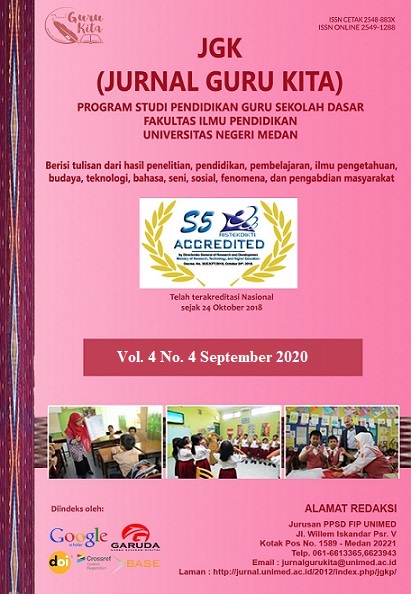NILAI DAN MODEL PENDIDIKAN KEWIRAUSAHAAN DI SEKOLAH DASAR
DOI:
https://doi.org/10.24114/jgk.v7i1.41336Keywords:
Nilai, Model, Pendidikan Kewirausahaan.Abstract
Tujuan penelitian adalah mendeskripsikan nilai dan model pendidikan kewirausahaan di tingkat sekolah dasar. Adapun metode penelitian yang digunakan adalah studi pustaka. Hasil penelitian memberikan gambaran bahwa pendidikan kewirausahaan dapat membiasakan karakter seorang wirausaha pada diri peserta didik melalui penanaman nilai-nilai kewirausahaan. Untuk mengimplementasikan hal tersebut, maka pendidik perlu menggunakan model pendidikan kewirausahaan yang tepat dengan menganalisis kebutuhan dan perkembangan peserta didik mulai dari perencanaan, pelaksanaan, sampai pada penilaian bahkan evaluasi. Oleh karena itu, ada berbagai model pembelajaran kewirausahaan yang dapat digunakan selama proses pembelajaran kewirausahan berlangsung agar lebih terstruktur dan sistematis.References
Adji, S. W. (2016). Penanaman Nilai-Nilai Kewirausahaan ( Studi Kasus di Sekolah Dasar Negeri Model Kota Malang). Jurnal Tarbiyah (Jurnal Ilmiah Pendidikan), 5(2), 79“95.
Afandi, M. (2021). Implementasi Pendidikan Kewirausahaan ( Entrepreneurship ) di Sekolah Dasar / Madrasah Ibtidaiyah. 5(1), 51“63. https://doi.org/10.29240/jpd.v5i1.
Afrianty, T. W. (2019). The Role of Feasibility And Entrepreneurial Self-Efficacy on The Link Between Entrepreneurship Education and Entrepreneurial Intentions. AdBispreneur : Jurnal Pemikiran Dan Penelitian Administrasi Bisnis Dan Kewirausahaan, 4(3), 193“206.
Bachri, A. S., & Setiani, A. (2018). The Influence of Creativity and Learning Innovation on Entrepreneurial Mentality and its Implications for Learning Outcomes. Dinamika Pendidikan, 12(2), 148“158. https://doi.org/10.15294/dp.v12i2.13563
Daryanto. (2013). Inovasi Pembelajaran Efektif. Yrma Widya.
Guerrero, M., Urbano, D., Cunningham, J., & Organ, D. (2012). Entrepreneurial Universities in Two European Regions: A Case Study Comparison. Journal of Technology Transfer, 39, 415“434.
Hennink, M., Hutter, I., & Bailey, A. (2020). Qualitative Research Methods. Publications Limited.
Johannisson, B. (1991). University Training for Entrepreneurship: a Swedish Approach. Entrepreneurship and Regional Development. Entrepreneurship and Regional Development, 3(1), 67“82. https://doi.org/https://doi.org/10.1080/08985629100000005
Mulyani Endang. (2011). Model Pendidikan Kewirausahaan di Pendidikan Dasar dan Menengah. Jurnal Ekonomi Dan Pendidikan, 8(1), 1“18.
Rina, L., Murtini, W., & Indriayu, M. (2019). Entrepreneurship Education: Is It Important for Middle School Students? Dinamika Pendidikan, 14(1), 47“59. https://doi.org/10.15294/dp.v14i1.15126
Sarmanu. (2017). Dasar Metodologi Penelitian Kuantitatif, Kualitatif, dan Statistika (1st ed.). Airlangga Univerisity Press.
Setiti, S. (2021). IMPLEMENTASI NILAI KEWIRAUSAHAAN DI SEKOLAH DASAR NEGERI SUNGAI BESAR 7 BANJARBARU.pdf. http://eprints.ulm.ac.id/id/eprint/8588%0A
Sugiyono. (2014). Metode Penelitian Kuantitatif, Kualitatif, dan R&D. Alfabeta.
Walidin, W., Idris, S., & Tabrani. (2015). Metodologi Penelitian Kualitatif & Grounded Theory. FTK Ar-Raniry Press. https://repository.ar-raniry.ac.id/id/eprint/1301
Welsh, D. H. B., Tullar, W. L., & Nemati, H. (2016). Entrepreneurship education: Process, method, or both? Journal of Innovation and Knowledge, 1(3), 125“132. https://doi.org/10.1016/j.jik.2016.01.005
Xavier, R. S., Kelley, D., Kew, J., Herrington, M., & Vorderwulbecke, A. (2012). Global Entrepreneurship Monitor: 2012 Global Report. Global Entrepreneurship Research Association. https://www.gemconsortium.org/file/open?fileId=48545
Zed, M. (2004). Metode Penelitian Kepustakaan. Yayasan Pustaka Obor Indonesia.
Downloads
Published
How to Cite
Issue
Section
License
Authors published with the JGK (Jurnal Guru Kita) agree to the following terms:
- Authors retain copyright and grant the journal the right of first publication with the work simultaneously licensed under a Creative Commons Attribution License (CC BY-SA 4.0) that allows others to share the work with an acknowledgment of the work's authorship and initial publication in this journal.
- Authors are able to enter into separate, additional contractual arrangements for the non-exclusive distribution of the journal's published version of the work (e.g., post it to an institutional repository or publish it in a book), with an acknowledgment of its initial publication in this journal.
- Authors are permitted and encouraged to post their work online (e.g., in institutional repositories or on their website) prior to and during the submission process, as it can lead to productive exchanges, as well as earlier and greater citation of published work. (See The Effect of Open Access)













